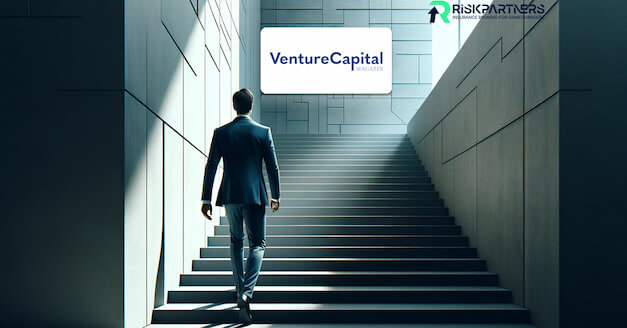Risk Partners Life Sciences Roundtable 2025, thank you very much!
Risk Partners Life Sciences Roundtable 2025, thank you very much!
In addition to everything important about D&O insurance for growth companies, we also explain why growth companies often encounter problems with D&O insurance or tend to get poor conditions and how you should deal with them.

A common dilemma for start-ups, especially in the early stages with limited financial resources, is the question: "Do we already need D&O insurance?" To answer this question, it makes sense to assess the probability of occurrence and the potential extent of risks. For example, a self-financed GmbH without a customer base and external financing (both equity and debt capital) could theoretically be exposed to a risk, but the realistic loss scenarios are so limited that the conclusion of D&O insurance could generally be postponed for the time being. However, this changes fundamentally when a company enters the market or raises equity or debt capital. From this moment onwards, potentially "injured parties" are involved who could assert their claims via the attractive directors' and officers' liability.

In Germany and other countries, the management of a company is expected to perform its duties responsibly and diligently. This strict (in parts certainly too strict) standard contributes to the trust of (foreign) investors and also customers. This strict standard applies equally to founders regardless of the age of the company, be it a UG, GmbH or later an AG or a European Company (SE). A thorough understanding of the liability framework is essential for founders, as they are directly confronted with the risks associated with the role of managing director of a GmbH, for example.
Here are five key aspects of liability that every founder of a startup in Germany should be aware of:
Joint and several liability: As a founder, you are not only liable for your own negligence, but also for breaches of duty by other managers in the company. This means extended responsibility and increased risk. The larger the company becomes, instruments such as departmental cuts can help, but the monitoring obligation will always leave a residual risk for each body (e.g. supervisory board, managing director, board of directors).
Liability for slight negligence: Many founders are not aware that even slight negligence can be enough to be held liable. In the hustle and bustle of everyday start-up life, this can happen quickly, for example in a critical phase of the company and the legal inability to pay ("delay in filing for insolvency").
Internal and external liability: Founders can be held legally liable both by their own startup / scaleup and by external parties (such as customers, competitors or suppliers). Most of the pending disputes in Germany relate to internal liability, but cases of external liability should not be underestimated and could increase as a result of legislative initiatives (NIS 2).
These aspects underline the importance of D&O insurance for start-ups and their founders. It provides a necessary shield against the financial risks associated with management responsibility and allows founders to concentrate on the growth and success of their company with peace of mind.
D&O insurance, a specific type of financial loss liability insurance, is a crucial protection mechanism for start-ups and their founders. It is usually taken out by companies to protect their executives and decision-makers - those who control the startup's destiny. In this context, D&O insurance acts as an insurance policy in favor of third parties as well as the company itself ("balance sheet protection").
As financial loss liability insurance, the insurance cover includes both the defense against unjustified claims as well as the the assumption of justified claims from affected parties. A key aspect here is the protection of the private assets of managers, which is of immense importance for founders of start-ups in particular. In a phase in which the company is often faced with rapid changes and challenges, D&O insurance offers necessary protection against financial risks that may result from entrepreneurial activity. Here are four examples:
Situation: A tech start-up has developed innovative software. The founders have inadvertently infringed a competitor's copyright, which leads to a legal dispute. As a result, investors are also annoyed as there are considerable additional costs due to additional coding.
Problem: The founders of the start-up have been held personally responsible for the copyright infringement and the costs associated with the new development. The legal dispute threatens to place a financial burden not only on the company, but also on the founders' personal assets.
D&O insurance cover: The startup's D&O insurance covers the costs of legal defense and claims for damages.
D&O situation: A scaleup in the e-commerce sector has expanded rapidly and neglected internal control mechanisms. This leads to incorrect financial reports.
Problem: Investors who had invested on the basis of these reports are suing for misleading information. The management is held responsible for the false information.
Insurance cover: D&O insurance covers the costs of legal defense and any compensation payments. This protects the management from a seven-figure claim for damages.
Situation: A young biotech gets into financial difficulties. Despite their obvious inability to pay, the founders delay the necessary filing for insolvency in the hope of attracting additional investors.
Problem: When insolvency is finally filed, the insolvency administrator brings charges against the founders for delaying insolvency. This represents a serious legal risk that can lead to both criminal and civil law consequences.
D&O insurance cover: The startup's D&O insurance covers the costs of the founders' legal defense. Although the insurance does not offer protection against criminal sanctions, it helps to reduce the financial burden of civil law disputes and thus protects the founders' private assets.
A deep-tech scaleup is sued by a major corporation for alleged patent infringement.
Cost risks:
Insurance solution: the insurance covers the costs of the defense and actively helps to assert your own rights against the company.
Our Managing Director Florian was a guest on the podcast of the life science specialists from Pates and gives valuable tips on the topic of "manager liability".
Unfortunately, there is no one-size-fits-all answer here, as the costs of D&O insurance for start-ups and scale-ups vary considerably and depend on various influencing factors, particularly in the case of high-performance insurance policies such as "Risk Partners D&O Prime Protect". The main determinants include the size and stage of development of the company, the sector in which it operates, the profitability and structure of the balance sheet, the amount of cover and the founders' previous business experience.
For example, start-ups in riskier sectors such as the defense industry or FinTech have to pay higher premiums than those in less risky sectors. The company's financing history also plays a role, as a short financial reach (runway) can significantly increase the risk and therefore the cost of insurance, as insurers consider the risk of insolvency and possible insolvency proceedings to be particularly critical. In Germany, the annual premiums for D&O insurance for start-ups generally range between EUR 750 and EUR 3,500 for a sum insured of EUR 1 million, although the costs for scale-ups can be higher due to their extended risk profile and higher sums insured. However, these ranges are only guidelines and can vary depending on the individual situation and the structure of the D&O insurance program.
Florian was recently invited to the #VentureMate podcast with Artur Schneider and Luca Grunwald from the HHL Venture Capital Club and talked about our experiences in risk management.
As already discussed in section 1, the liability of a GmbH managing director is unlimited, meaning that this can only be used to a limited extent for the optimum sum insured. Other common methods for determining the sum insured, such as 20% of the balance sheet total or
10% of the annual turnover, often prove to be less meaningful for start-ups and scale-ups (and not only here), as these figures do not necessarily reflect the actual risk. For example, a disappointed business angel could claim his loss due to a managing director's misconduct, but this is not reflected in the HGB balance sheet. Instead, it is more expedient to think through possible loss scenarios and calculate the worst-case scenario plus a premium of 30-40% for legal costs in order to ensure adequate protection. An experienced consultant can help you with typical loss events for companies in your situation.
For 100% of growth companies, the sum insured should also be reviewed annually and adjusted to the individual risk. The topic of "exit", as described in the next section, should be included in the exchange with the specialist broker at an early stage. This makes it possible to use favorable situations, such as a new financing round with a high level of interest from insurers, to establish a medium and long-term consortium for the D&O insurance. Exit risks can also be hedged at an early stage.
While growth companies often offer high upside potential for investors, the profit for the D&O insurer is limited to the insurance premium. In contrast, the risk, in this case the so-called downside, can be significantly higher in the event of a claim and can extend to the sum insured as well as to additional benefit modules, such as those provided for in our Risk Partners terms and conditions. In the worst-case scenario, a net annual premium of EUR 750 could therefore be offset by a claim in the millions. This makes it necessary for the D&O insurer to manage a carefully compiled portfolio of risks in order to avoid insolvency. This makes insuring start-ups and scale-ups, especially when higher sums insured are required, correspondingly challenging. Close coordination and the development of a long-term strategy are therefore essential in order to take advantage of favorable moments for the purchase of insurance sums and to ensure a clear risk presentation to the insurers. Growth companies should take particular care not to appoint an insurance broker who merely passes on annual reports without explaining the background to the insurers in detail. You should also take a closer look at exclusions and the insurance conditions, as it is precisely these points that reduce the insurance cover for founders.
In addition, it is advisable to take a close look at the benefits promised by the D&O insurance and use the options on the legal protection insurance market to close any gaps in the cover. This includes criminal legal protection insurance, which is always recommended, as well as financial loss legal protection insurance. Although this does not cover the indemnification of those affected by the claim, it does cover the regularly high costs of proceedings and legal fees, often without, for example, insolvency exclusions. In addition, especially with regard to cyber risks, fidelity insurance, which has always played an important role in advising executives as a risk transfer topic in the area of intent, is becoming increasingly important and should be evaluated as part of the advice.
If a growth company is planning an exit of the founders/investors, whether through an IPO or a sale to private equity or a strategist, it is crucial to understand the implications of this step for D&O insurance (Directors and Officers Liability Insurance). This is because it is at this stage that new shareholders join the company, ideally at a high price, who have a lot to lose in the event of a claim. It therefore has a considerable impact on the probability of a loss occurring, as described above. Even for the departing management, the "subsequent liability", which can last for at least five years, can lead to risky situations.
We therefore strongly recommend discussing such options openly with us at an early stage, for example in order to increase protection before and after the exit by strategically purchasing insurance sums in the D&O insurance with special clauses. If this is implemented in good time before the exit, so-called Warranty Statements can also be concluded well before this high-risk event, which then do not cover the critical pre-IPO / pre-exit phase. Personal D&O insurance can also be a valuable instrument, but it must also be purchased well in advance. Other special solutions are also highly relevant, such as advice on M&A insurance (especially W&I insurance), on which we will be setting up a webinar with our partner in fall 2024, as well as POSI insurance as part of a capital market transaction.
As already mentioned in the introduction, the usefulness of D&O insurance depends on the probability of occurrence, meaning that there are situations in which there is a theoretical risk but taking out insurance can still be postponed. In all other cases, it offers powerful protection for managers and founders in phases of dynamic growth and in the event of important corporate events such as an exit. This is especially true when these are based on powerful special broker terms, whether it is our Risk Partners D&O Prime Protect or from other special brokers. Furthermore, the unlimited personal liability that comes with running a startup makes careful selection and adjustment of D&O insurance essential. As a founder, you are therefore required to take time for this task every year.
The cost of D&O insurance varies depending on company size, industry and individual risk profile, among other factors. This poses a particular challenge for start-ups in high-risk industries and scale-ups that require higher sums insured. Strategic planning and close coordination with a specialized insurance broker are therefore crucial to ensure adequate cover.
In the event of an exit, be it through an IPO or sale to private equity or strategic investors, the risks and the need for adapted D&O insurance increase, as does the need for special insurance in the interests of management (e.g. coverage for shareholder lawsuits). Early and open communication with the insurance partner about these plans and the associated risks is therefore essential.
In summary, D&O insurance is not only a shield against potential risks and liability claims, but also an essential part of the risk management strategy for any growing business. Appropriate D&O insurance allows founders and executives to focus on the growth and success of their business while being protected from unforeseen legal challenges.
Creativity and
innovations
Experienced D&O experts

Probably the most important insurance for a clinical trial worldwide. Our experts provide a brief introduction.

If patents/IP is the value of your company, you can find out everything you need to know about relevant insurance policies here

Alongside D&O insurance, this is probably the most important insurance for a European IPO. Our experts provide a brief introduction.

Another important insurance for volunteers in clinical trials. Our experts briefly introduce these.
Request our guides now
